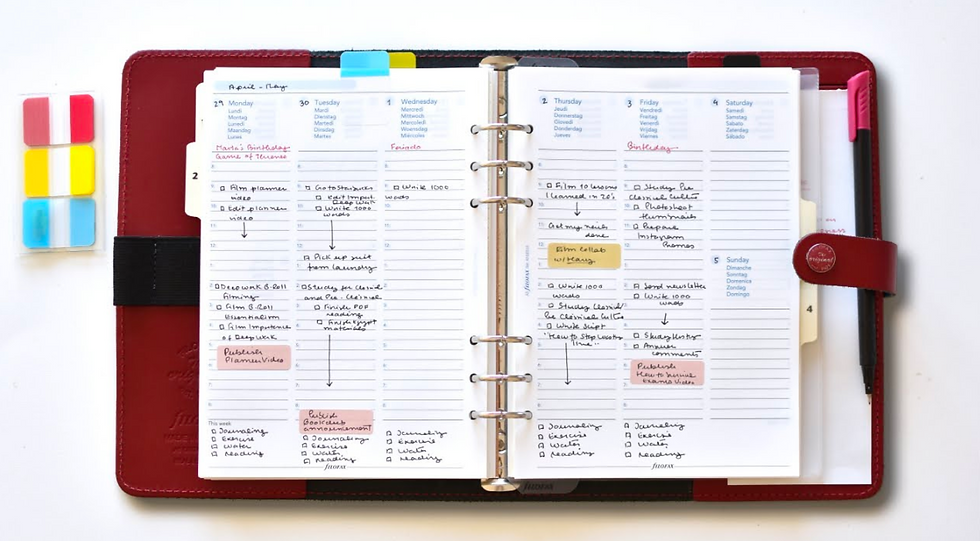Mental Health: Tips To Organize Your Schedule
- Hannah Horsley
- Nov 28, 2023
- 4 min read

College life can be incredibly rewarding, offering a variety of opportunities for growth. It also comes with freedom in the aspect of managing your workload and making time for yourself. While it can be personally fulfilling to organize your own schedule and control your free time, it also presents its own set of challenges. Balancing assignments, exams, extracurricular activities, personal time, and even a job can be overwhelming. Many students may become stressed and anxious due to not effectively managing their schedule, which can lead to difficulty focusing, lack of energy, and loss of interest in activities. There are ways to prevent burnout and mental distress when it comes to college life and that’s why it’s crucial to set clear goals, create a weekly schedule, and plan accordingly.
Setting Clear Goals:
To begin organizing your schedule, it’s important to know what goals and priorities you have for yourself. Whether it may be getting assignments completed before the weekend, going to the gym a certain number of times throughout the week, or attending more social events, setting a clear goal for yourself will put you in the right direction to build an effective schedule. With that being said, it might be difficult to determine what goals you want to set for yourself to align with your academic and personal objectives. To help decide what types of goals you want to focus on to guide your schedule, start with a simple self-reflection. Think about what short and long-term goals you have for yourself, what you value, and what’s most important to you in your academic and personal life. Next, make a list of all your current commitments (e.g., classes, projects, extracurricular activities, work, social commitments, and personal responsibilities.) Now that you see everything you have on your plate, divide your commitments into two sections labeled, “Have to Do” and “Want to Do.” This will show you what needs more attention and what can wait. Finally, set your goals to be specific, measurable, and attainable! Using a goal-setting technique like SMART goals can help put more focus on the goals, increasing your chance of achieving them. SMART goals are specific, measurable, achievable, relevant, and time-based. So, if you want to dig deeper and continue to set more goals for yourself, this technique is a great way to realistically set and measure them!
Creating a Weekly Schedule:
Now that your goals are set, it’s time to prepare a weekly schedule. There are different platforms to use when it comes to putting together a schedule. You can use a weekly planner purchased from a store, the calendar on your phone, Google Calendar, Microsoft Outlook, Canvas, or you can even make your own using online tools. To effectively use your schedule to plan accordingly and look back at it, it is important to make sure you can access it when you need it. So a digital option will be better unless you make sure to keep your physical planner with you. To start planning your week, a good first step is to write down your classes in their allocated days and times with any mandatory events you might have, including work. Next, make note of any tutoring, study sessions, and group meetings. It’s also nice to have a monthly calendar as well, it can make it easier to see what you need to plan for each week and allows you to plan further ahead. After planning all of your mandatory activities, you now have your open availability for personal time and friends. It’s crucial to set aside some time for yourself so that you can relax and destress.

Importance of Incorporating Self-Care:
One of the most vital aspects of organizing your schedule effectively, especially in the context of mental health, is ensuring that you prioritize self-care. In the busy lifestyle of being a college student, it's easy to overlook self-care activities. Not making time for yourself can cause poor mental health, which can make it extremely difficult to enjoy your free time and academics. A few simple actions to make sure self-care is integrated into your daily routine can tremendously impact your mental state. For example, practice mindfulness during your commute, take short breaks to stretch and relax between study sessions, or use relaxation techniques before bedtime to ensure a restful night's sleep. A way to make sure that you have enough time for yourself is to set boundaries and say no. Understand that it's okay to decline additional activities when your schedule is already filled. Learning to say no politely but firmly allows you to protect the time you've allocated for self-care, preventing burnout and promoting a healthier work-life balance.
The overall process of organizing your own schedule provides you with more structure to maximize efficiency and can get you on the right track for whatever you are enduring. Using these helpful tips will easily allow you to prioritize your day, weeks, and months. As you continue on your academic journey, remember that life is unexpected, and your schedule may need to be changed along the way. Be flexible, stay open to growth, and, most importantly, be kind to yourself. Your mental health is as important as your academic achievements, and finding the right balance is a journey worth embracing.
.png)



Comments